Original Staff at the Peace Corps, 1961 (Part Two)
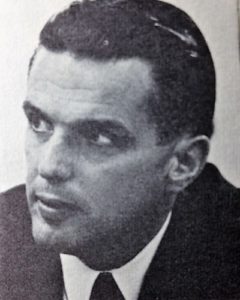 The Peace Corps’ original executive secretary was Bradley Patterson Jr., who had been one of the State Department’s veteran executive secretaries. A mountain climber by avocation, Patterson helped set up the first Cabinet secretariat and then served as assistant secretary to the Cabinet under President Eisenhower, where his performance led to his receiving the Arthur S. Flemming Award for 1960. His duties have taken him to international conferences and to George Washington University, where he lectured on public administration. He left the Peace Corps to become special assistant to the Secretary of the Treasury.
The Peace Corps’ original executive secretary was Bradley Patterson Jr., who had been one of the State Department’s veteran executive secretaries. A mountain climber by avocation, Patterson helped set up the first Cabinet secretariat and then served as assistant secretary to the Cabinet under President Eisenhower, where his performance led to his receiving the Arthur S. Flemming Award for 1960. His duties have taken him to international conferences and to George Washington University, where he lectured on public administration. He left the Peace Corps to become special assistant to the Secretary of the Treasury.
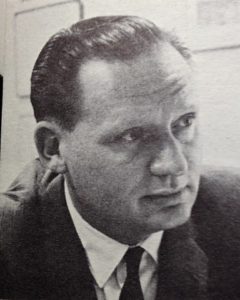 The man who set up the Medical Division was Dr. Lee J. Gehrig, an honor graduate of the University of Minnesota Medical School and veteran surgeon with the U.S. Public Health Service. Part of his career was spent roaming Alaska in a campaign against tuberculosis and part on the high seas—as ship’s physician aboard the three-masted Coast Guard sailing ship, “Eagle”. An interest in the health problems of seafarers led to a wider interest in medical problems of persons for whom health facilities were not readily available, and this fitted right in with the situation of many Volunteers.
The man who set up the Medical Division was Dr. Lee J. Gehrig, an honor graduate of the University of Minnesota Medical School and veteran surgeon with the U.S. Public Health Service. Part of his career was spent roaming Alaska in a campaign against tuberculosis and part on the high seas—as ship’s physician aboard the three-masted Coast Guard sailing ship, “Eagle”. An interest in the health problems of seafarers led to a wider interest in medical problems of persons for whom health facilities were not readily available, and this fitted right in with the situation of many Volunteers.
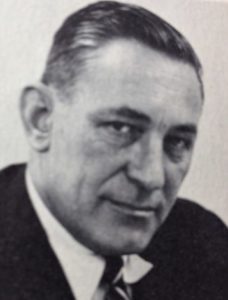 Opening-day chief of the Division of Private Organizations was Gordon Boyce, then on leave from his twin jobs as president of the U.S. Experiment in International Living and secretary-general of the international organization. Born in Binghamton, N.Y. where he worked for one year as a reporter on the Binghamton Sun, Boyce received B.A. and M. A. degrees from Colgate and served as Assistant to the President of Colgate after five years of World War II sea duty with the U.S. Navy. He returned to the Experiment, which conducted training for the Venezuela University, Venezuela YMCA and Chile YWCA projects and handled both training and overseas administration for the first project in East Pakistan.
Opening-day chief of the Division of Private Organizations was Gordon Boyce, then on leave from his twin jobs as president of the U.S. Experiment in International Living and secretary-general of the international organization. Born in Binghamton, N.Y. where he worked for one year as a reporter on the Binghamton Sun, Boyce received B.A. and M. A. degrees from Colgate and served as Assistant to the President of Colgate after five years of World War II sea duty with the U.S. Navy. He returned to the Experiment, which conducted training for the Venezuela University, Venezuela YMCA and Chile YWCA projects and handled both training and overseas administration for the first project in East Pakistan.
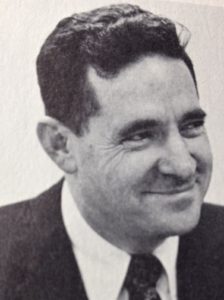 First General Counsel was Atlanta lawyer Morris Abram, one of the nation’s leading champions of civil rights. A graduate of the University of Georgia with a Doctor of Jurisprudence degree from the University of Chicago Law School, Abram was one of the American prosecutors at the Nuremberg trials after serving as an Army Air Force officer in World War II. He was on the Board o Trustees at the Twentieth Century Fund and the Field Foundation. Former chairman of the Atlanta Citizens Crime Committee, he returned to his law practice in the firm of Heyman, Abram and Young, where he successfully demolished Georgia’s county-unit election system through the courts.
First General Counsel was Atlanta lawyer Morris Abram, one of the nation’s leading champions of civil rights. A graduate of the University of Georgia with a Doctor of Jurisprudence degree from the University of Chicago Law School, Abram was one of the American prosecutors at the Nuremberg trials after serving as an Army Air Force officer in World War II. He was on the Board o Trustees at the Twentieth Century Fund and the Field Foundation. Former chairman of the Atlanta Citizens Crime Committee, he returned to his law practice in the firm of Heyman, Abram and Young, where he successfully demolished Georgia’s county-unit election system through the courts.
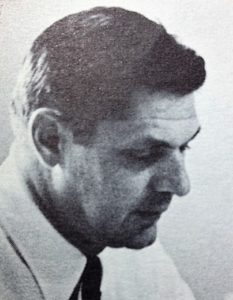 Ross Pritchard, a planning officer, was a wartime Navy tail gunner and a four-year letterman at the University of Arkansas, where he was named the outstanding pass catcher of the Southwest football conference. With a Ph.D. from the Fletcher School of Law and Diplomacy, he joined the faculty of Southwestern in Memphis as an expert on foreign affairs.
Ross Pritchard, a planning officer, was a wartime Navy tail gunner and a four-year letterman at the University of Arkansas, where he was named the outstanding pass catcher of the Southwest football conference. With a Ph.D. from the Fletcher School of Law and Diplomacy, he joined the faculty of Southwestern in Memphis as an expert on foreign affairs.
Two Notes:
Brad Patterson, at some point after his Peace Corps assignment, was executive director of the staff of President Johnson’s National Advisory Commission on Selective Service. I was seconded from the Peace Corps to that staff and charged with with writing an analysis of the increasingly frequent proposal for service in the Peace Corps or other voluntary service agency to be considered as an alternative to the military draft. (I think Harris Wofford had something to do with me getting that assignment.) The proposal was not welcomed by the most of the Commission members. A pressing question was what domestic volunteers would do that would equal military service. One of the Commission’s members, a former commandant of the Marine Corps, heard the suggestion that domestic volunteers could help teachers all over the country, in part by getting the younger students appropriately dressed for bad weather. As a former Marine, he thought that idea was outrageous, that nothing equaled military service, and thereafter he disparaged the idea of voluntary service as an alternative to the draft by calling it “that snowsuit program.” That was the end of the voluntary service alternative. The actual result of the Commission’s work was the establishment of a lottery system to determine who got drafted. When the Commission’s work was done, I moved over to the State Department to direct “Volunteers to America,” the reverse peace corps program that had foreign volunteers working in U.S. schools and social work agencies. It lasted three years until conservative members of Congress found out about it.
Morris Abram, another in the list of PC alumni in this post, went on to become the U.S. Ambassador to the United Nations and Other International Agencies in Geneva, a post that he served with great distinction.
Thanks, Neil, for that background. I didn’t know your role. I’m sure others also didn’t know the part you played. These Ethie Ones; they are always up to something.